Interview: Bryan-Keyth Wilson And Dr. Arelia Johnson Open Up About the Intimate and Accepting World of STRAPPED at The Shrine Of The Black Madonna
Tickets are now FREE for this workshop, which is only being presented this weekend!
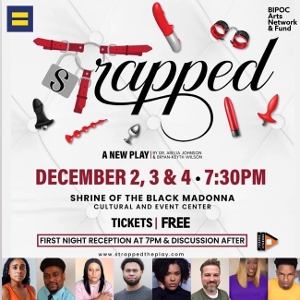
This weekend, The Normal Anomaly Initiative, Inc. will be presenting a workshop production of sTrapped, a new play by Dr. Arelia Johnson & Bryan-Keyth Wilson and also directed by Wilson.
In sTrapped, seven strangers come to the theatre expecting to see Award-Winning playwright Bryan-Keyth Wilson's new play about gun violence, but they are told by the stage manager the performance is canceled. Tempers flare, and a mysterious, omnipresent voice begins to calm the audience down and interrogate the seven strangers who are upset. Trauma is uncovered as we learn about the seven strangers and deeper conversations on sexuality, religion, and colonization come to the surface.
I am very excited to see this production myself this Saturday, and it was my absolute pleasure to speak with Bryan-Keyth Wilson and Dr. Arelia Johnson (the co-writers of the piece) to learn more about the upcoming show. Through my conversations with this dynamic duo, we discussed their collaboration, the research that went into developing this meaningful production, how it has been building the play with the actors, and more.
Bryan, what is your background as an artist, and what inspired you to start writing plays?
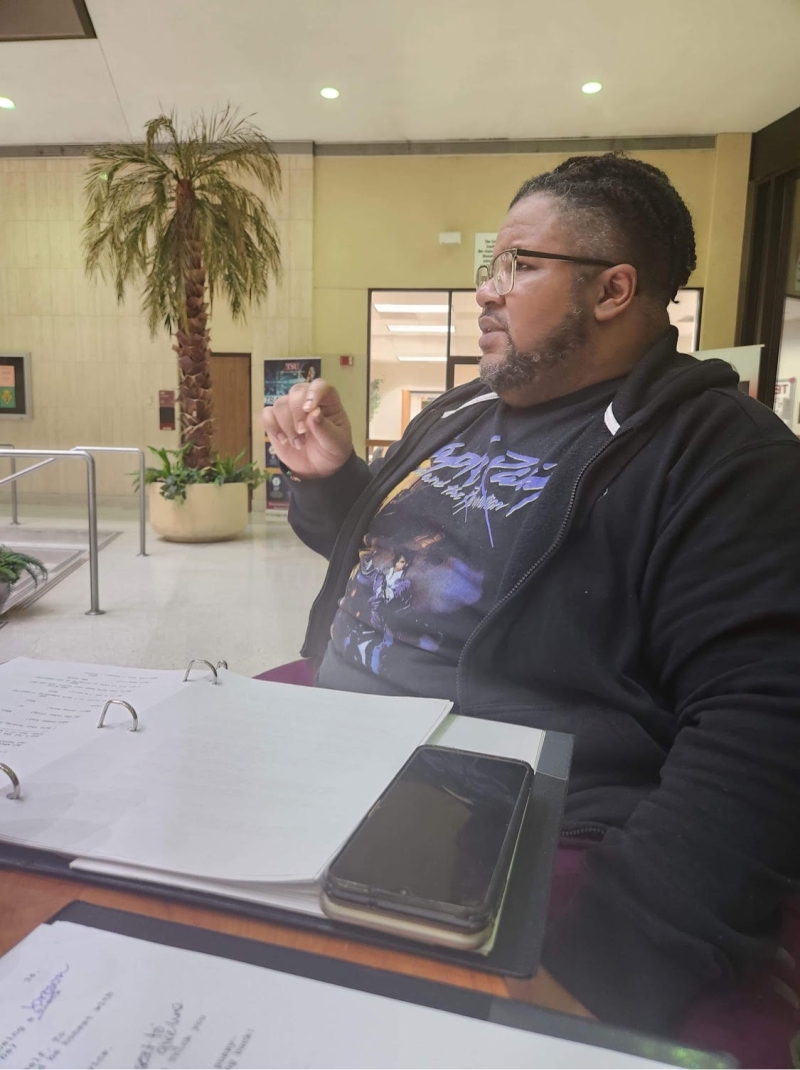
During Rehearsals of sTrapped
Bryan-Keyth Wilson: My background started in the high school marching band, and there were auditions for plays. I had been doing plays as a kid in church and for different things around the community, but I never really focused on theater until my freshman year of high school. That's when the bug bit me. I then went to Sam Houston State University, and that's when I really centered my focus on this as a career.
Bryan, what brought you from musical theater to writing plays?
Bryan-Keyth Wilson: At Sam Houston, we have the same call general auditions where everyone comes out and auditions, and in high school, everyone is the big fish, but when you get to college, all of the big fishes are there. That was the first time that I had auditioned and not been cast for something, so I thought that I would just go to go to my room and start writing a play. From that moment on, I realized that there's something else in this business besides just being on the stage. As the years progressed, I moved to New York City and went through the auditioning phase of living in a big city; it's not the easiest, and you don't always have the opportunity to do plays where you're represented in them. The thing is that for a lot of us in this industry, we don't see representation of ourselves on the stage a lot, and that was one of the things that really brought me into playwrighting. It's like, if I don't write plays for people that look like me, then I don't know if I'll ever have opportunities or jobs. So, that's kind of what really happened. I said, let me go ahead and start writing plays, and I started writing plays and producing them off-off-Broadway at the Variety Cafe in Rockefeller Center!
Dr. Johnson, you have an incredible resume with a diverse background in academia, social work, and more. What in your background brought you into the theatre world in Houston? In other words, what inspired you to start writing plays?
Dr. Arelia Johnson: My background in dealing with sexuality and gender started at Texas Southern University. I got a master's degree in sociology, and I was on the award-winning debate team as well as in 2005, I became the Houston slam champion. I've always had an interest in writing; I wrote and published my first book in 2013 and then I of course wrote my master's thesis. I then went on the Howard to get my PhD, so writing has always been in my blood. I was published for the first time as a poet in the 8th grade, so that's always been something that I wanted to do. When I taught at Bowie State University, I ended up writing a mini production for my students called the gender monologues, and it was taken out of interviewing them, watching them throughout this semester, and using one of the books that I published as this springboard for them to really delve into their identities and expressions. I've always wanted to marry academics with the creative arts.
Dr. Johnson, I am just astounded by how much you are actively working on being a project manager for the Harris County Juvenile Probation Department, publishing academic articles, helping write this play, and being a mother of two. What does a typical day which includes a play rehearsal look like for you?
Dr. Arelia Johnson: So, since my biography for this production, I've gotten a raise and a promotion, so the day is a little bit more hectic now! For me, a day is full of writing. I just finished working with an entrepreneurial program at the University of Houston, and I recently wrote a curriculum for middle school and high school students that's using hip-hop and augmented reality to teach them English language arts, reading, and history. I still do training and development especially when it comes to DEI. I actually have to sit down today and really make myself focus on getting this proposal done for a conference that's coming up in April that's centered on black sexuality. Plus, a day is making sure that my babies still do their homework; I want to show up and be present for them. My days also consist of writing a book that's coming from the research that is responsible for sTrapped. The book is called "Sex Talk", and I have to get that manuscript finished by the end of December so we can have it published at the beginning of 2023.
Can you tell us a little about sTrapped? What is a good summary for the production?
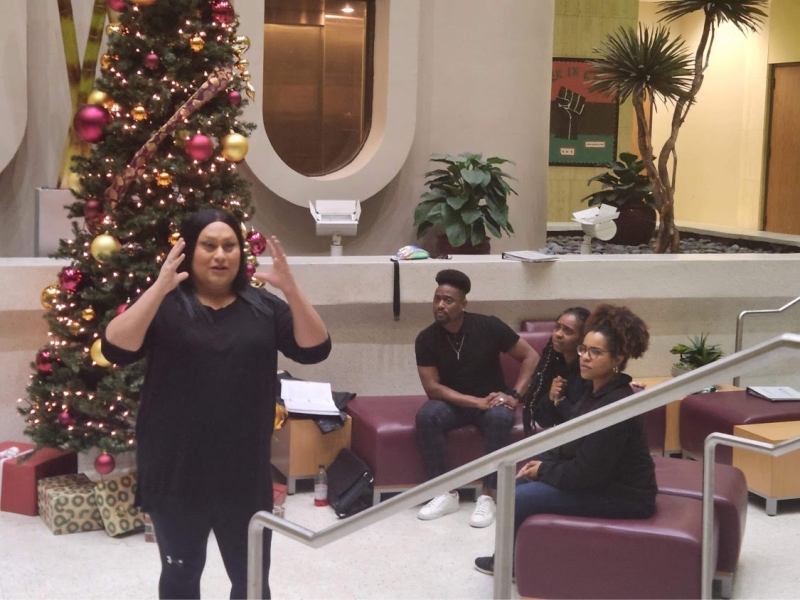
Cameron King, and Tro'Sha Monique Pickrom
in the World of sTrapped
Bryan-Keyth Wilson: There are so many stories in sTrapped, so it is really hard to sum all of them up. I guess the ideal summary is to not be afraid to tap into the things that you truly desire. Every character in sTrapped is dealing with certain things that they desire but because of the hetero norm, the normative society that we live in, a lot of them are afraid to voice or act on their true desires. They don't want to be deemed gay if they're into pegging, and they don't want to be deemed gay if they're into trans women. Some of the women don't want to be deemed "loose women" or whores because they want a great sex life. This story is like the "Get Out" movie but in the theater; these characters believe they're coming to see a play, but as the play starts, they realize that they are the play- they are the central focus of the night.
Dr. Arelia Johnson: I guess right now I'm calling it my piece of resistance! This play is a conversation starter. It's a way for people to walk away thinking, and not just in the traditional dry academic way. How do you tackle these mythical norms? How do you tackle these ideological fictions when it comes to gender, how we imagine gender? How are we socialized to believe that gender is supposed to function? I really want people to walk away from sTrapped looking at it from the standpoint that everyone can be who they are, and what you do sexually, how you show up, how you perform gender, and how you experience and express your gender is intricately tied into who you are. sTrapped is an immersive experience.
Bryan, you clearly have a lot of experience with playwriting. What inspired you to write this play?
Bryan-Keyth Wilson: Well, I came off of the world premiere of For Colored Boyz, and I was on the verge of a nervous breakdown with freedom. For Colored Boyz was a poem that I wrote that centers around 5 black men and their journey through the world that starts from slavery to yesterday, and it centralizes on how they're navigating through the different issues in their lives. I had been writing For Colored Boyz- that journey- for almost 7 1/2 years. After winning the Stories of Diversity Competition at the Fulton Theatre, I said that I wanted to have a commission from someone. Ian Haddock, who is one of my past students, is the executive director of The Normal Anomaly Initiative, which is a queer black non-profit here in Houston. He reached out and said, "I got something for you", and I was like, "OK, cool!" He was telling me that it was a play based off of Dr. Johnson's research on people who have different stories within their intimacy surrounding pegging and strap-ons. The first thing I said to myself was that, "Bryan, you cannot write the dildo play after coming off of For Colored Boyz." So, I wanted to talk to Dr. Johnson and see what she had to say about the play. The moment that we started talking, I was just in awe of her approach to the research. A lot of the stories dealt with people who had certain traumas around their sexuality that lead them to intimacy practices with pegging and strap-ons, so I thought that we could dig even deeper than that. So, she and I started talking about colonization and how in some aspects, we're bringing colonization into our bedrooms. We're bringing slavery into our bedrooms. We had so many good conversations. At first, I was asked to just write the play myself, but then she asked if she could co-write with me, and I instantly agreed. The great thing about cowriting with her is that we have two different voices within this play that really work well together.
How did you come into collaboration with Bryan, Dr. Johnson?
Dr. Arelia Johnson: I was working with The Normal Anomaly Initiative as a consultant, and I was talking to some of the staff members there. I shared that I was doing this research, and I really wanted to do something creative with it. I did not want it to just sit on the shelf, where research goes to die. The executive team asked me what I wanted to do, and I told them, "Don't judge me..." When I shared my work, they thought it was amazing, and they introduced me to Bryan! When we had a conversation, he gave me his experiences and his sociological, theoretical, theatrical experiences, and I gave him mine. We were able to sit down and knock the very first draft of the play in under a month!
When did the collaboration start?
Bryan-Keyth Wilson: We started working together in March or April, and it has been going on since. The crazy thing about this process is that she and I were never in a room together until we met for the play's workshop. I was back and forth between New York City and the Fulton Theatre in Lancaster, PA. Therefore, I wasn't in Houston much, leading to us writing the play remotely together.
Bryan, do you find any of your past works or writing styles impacting this play?
Bryan-Keyth Wilson: You know, it is crazy that you are asking that because one of the characters from a play that I wrote called The Rose of Sharon is one of the lead characters in sTrapped. It is close to World AIDS Day, and I shared with Dr. Johnson that I already had a character written that is HIV positive. I thought it would be a great idea to bring her on to this story because we get a continuation of what happened with Sharon in The Rose of Sharon and now what's going on for her.
How has it been in the rehearsal room? How is working with the artistic team and/or the cast of actors?
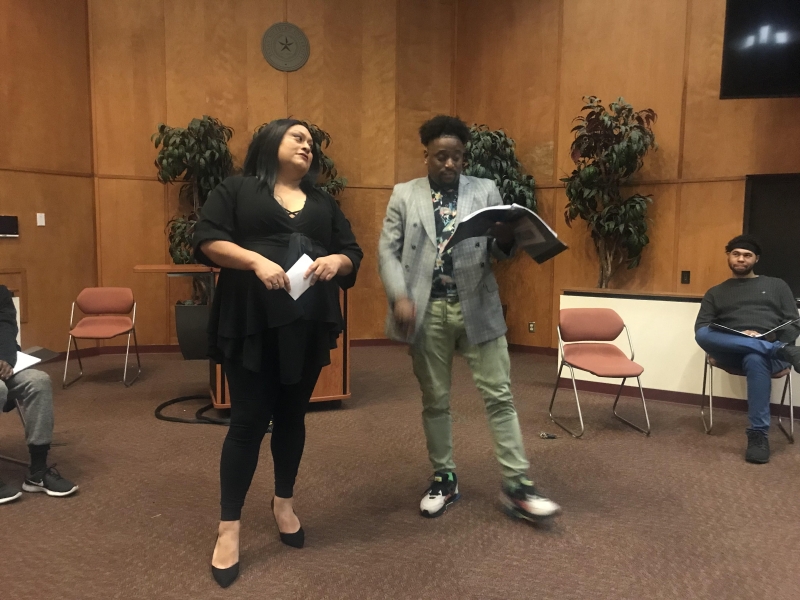
and Cardero Berryman Having Some Eyebrow-Lifting
Conversation in sTrapped
Bryan-Keyth Wilson: This process has been a breath of fresh air for me. In the midst of producing a play and just life itself, there are so many ups and downs in this business. However, getting in the rehearsal room with these actors has been such an awesome experience just because of the collaboration. The script itself is in a workshop phase, and so I love being able to talk with actors that are giving me their true opinions of the words, how the words come across their lips, and the rhythm and the patterns of their lines. It has been such a collaborative process working with every one of these actors, and they've been bringing a lot to the table. I love it; it is just a great opportunity to get in the space and play with the script with these actors! We have only had a short run of three weeks, but creating the world of sTrapped has been such fun, and like I said, the whole process has really been a breath of fresh air for me. I really needed it!
Dr. Arelia Johnson: Yea, it is great! It really is surreal because you're hearing the words come to life now. It is one thing to write something on paper, but it's another thing to see the nuances in the script and all of the complexity and layers that the cast brings to the script. I'm very grateful to just be in a space and share space with them, and I'm really excited about what the finished product is going to look like this weekend!
Have changes to the script been made in the rehearsal room?
Bryan-Keyth Wilson: Absolutely! I'm kind of an "old boy" when it comes down to script workshopping. I believe a script is like a baby; it has to sit in the womb for a while, go through its phases, and within those nine months...well, I would not say nine months because it took For Colored Boyz seven years to get where it needs to be... but I believe that play writing needs its time, like how the playwrights used to do it back in the day. I am really excited that we get to workshop the script and really see where the script is because the script has gone through changes within these last couple of months, and I love seeing that because it's just an evolution of where we are trying to be. The script is a work-in-progress, for sure.
Dr. Arelia Johnson: Yes, the production that's going to happen this week is a workshop production. We want to give Trapped legs and some life, and then we're going to see what works and what doesn't work. We are also going to have conversations with the audience, and then Bryan and I are going to go back into writing, altering, and amending the script. We will continue to move things around to make this play the best it can possibly be.
Dr. Johnson, for the productions this weekend, are you saying that there will be talkbacks?
Dr. Arelia Johnson: Yes, we will have talkbacks this weekend, and I'm excited to have those talkbacks because, what I discovered when I was doing my research, people really want to have this space. They want to have a safe, non-judgmental space to talk and raise questions about their fantasies and their desires. To hear someone say that they have no judgement in what you are saying and that your desires are completely okay is extremely powerful, and safe spaces can lead to real candid conversations.
Are there any artistic team or technical designs that we can look forward to?
Bryan-Keyth Wilson: This production is centered on the words and the script, so there is not going to be things flying in and out, things turning around, or explosions!
Dr. Arelia Johnson: Yes, right now, we are just focused on the play and the writing itself. Then, once we see it in this space, we'll be able to make the adjustments that we need to really bring sTrapped into this full-on production. I just really want to bask in the moment and really be present to see what it looks like on stage under the lights with the audience. I want to see how the audience is interacting with the cast, how the cast is interacting with the audience, and then be able to make a decision about what else needs to be added.
Why do you find this play timely and why did you choose to produce it in Houston? In other words, why now? Why here?
Dr. Arelia Johnson: I think it's overdue, especially with World AIDS Day coming up on December 1st! We are still dealing with the stigmatization, marginalization, alienation, and ostracization of people because they're different. I think that it is problematic that we are now in the 21st century and we're still having a hard time grappling with gender being a spectrum. We're still having a hard time grappling with race not being real and most definitely not being a monolithic experience. I think it's time for us to start pushing boundaries and providing people with spaces to see folks and hear folks say what they've been thinking. I think Houston is the most opportune place because Houston's home. Houston has its own culture, its own flavor. Houston is extremely diverse, and it is a very welcoming city, but I also think that it needs a push right now. It is hard to think about society right now and the political climate that that we're all experiencing coming out of a pandemic...I don't know how many more historical events I'm going to be able to suffer through! We have no more time to waste by not confronting what is actually reality.
What are your goals with this play? Do you hope to bring it anywhere else?
Bryan-Keyth Wilson: Absolutely! I'm open to whatever God has for the next step of this play. I know that we've just started entering it into festivals, so hopefully we can see what the theatre world has for sTrapped. It definitely is a story that, once it gets into other spaces, people's eyebrows are going to be raised. For example, we have a woman of trans experience, and we get to really see a story like this where the character isn't used for her trauma. Therefore, I'm really excited to see where this story is going to go and what this story is going to look like in different spaces.
Dr. Arelia Johnson: Honestly, I want to do what Eve Ensler was able to do with The Vagina Monologues! I want it to have its own day. We know that The Vagina Monologues comes in February, and I want you to know when sTrapped is coming in December. I want it on campuses, I want it in community theaters, and I want people to have access to this information because I think it's extremely important for people to understand that who they are and how they show up is really tied to how they formulate, think about, and interact with their sexual identity.
What is your favorite aspect about this play? What speaks to you?
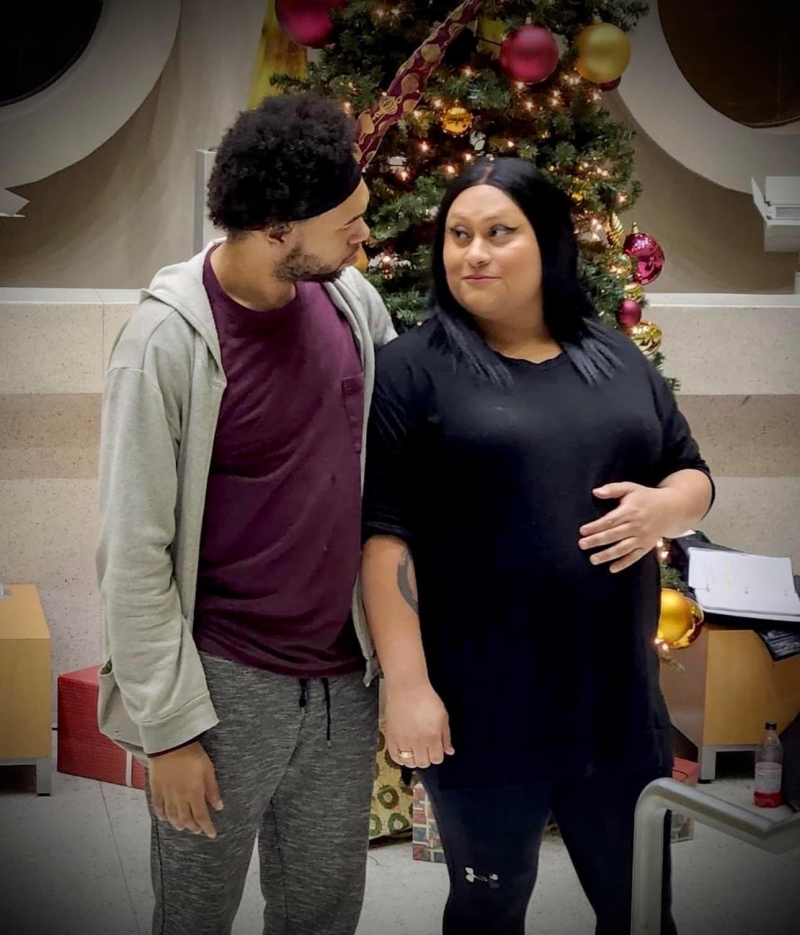
Getting Close in sTrapped
Bryan-Keyth Wilson: The truth of each actor's story is my favorite part of this play. I love that they have really taken on each of these characters delicately, and you can see it in their delivery when they're talking to each other. Their acting has been a joy for me.
Dr. Arelia Johnson: There are a couple favorite aspects for me. I think that the play itself speaks to me because it's my piece of art. It's my way of doing what I do academically as a thought leader and making this room in the academic world to say that academics doesn't have to be dry and boring; it can be art! Also, I think having the opportunity to have a trans woman on stage is a big deal for me because we don't see trans actors represented or being highlighted, especially if they're trans men. We do not see trans people being highlighted in academic literature either, so to have that kind of moment in this play is exciting for me. I'm also excited to see how the audience is going to respond to the conversation we're building around hyper-masculinity, toxic masculinity, and hyper-femininity. I cannot wait to hear how they will respond to the conversations around religion and ideology, and then there's this one particular moment that I'm really anxious about how the audience is going to respond...I'm really excited to see what kind of healing can come out of sTrapped this weekend!
Is there anything else you would like to share?
Dr. Arelia Johnson: I just want people to come out and enjoy it. I want audiences to have a good time and provide us with real feedback. I'm really looking forward to seeing how people experience the space. I don't want them to just come and watch; I want them to come and experience!
Bryan-Keyth Wilson: I definitely want all of Houston and the surrounding areas to come out and see this production of sTrapped written by myself and Dr. Arelia Johnson. Also, I want people to know more about The Normal Anomaly Initiative, which is based here in Houston, TX. Come out and celebrate World Aids Day and the holiday season with us. You know, we get a little bored of seeing The Nutcracker and A Christmas Carol...I mean, go out and see those shoes because we love all theatre in Houston...but for those that are looking for something that's a little different during the holidays, come on out and check us out!
sTrapped will run at The Shrine of the Black Madonna (5309 Martin Luther King Blvd, Houston, TX 77021) December 2-4, 2022. Tickets are FOR FREE, and you can get them at www.strappedtheplay.com.
The Normal Anomaly Initiative, Inc. is a Houston-based nonprofit dedicated to assisting Black, queer+ people with overcoming barriers and ending stigmas and problematic narratives. The Normal Anomaly Initiative supports its community by providing HIV tests, at-home tests, transportation for appointments and job interviews, employment assistance opportunities, sexual education classes, sex-positive liberation, and LGBTQ+ affirming trainings and events to uplift Black, queer+ persons and their culture. Their newest initiative is presenting sTrapped. You can read more about this nonprofit at their website: https://www.normalanomaly.org
Comments

Videos

